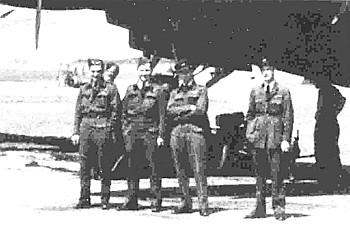Library Reference Number: 006
Invasion In The Offing
Squadron Leader Andrew Jackson, DFC, AE, MID. completed two operational tours. He flew with Nos.115, 149, 207 and 49 Squadrons. He recalls the following account of operational flying as an Observer during the early part of WW2.
 On the 7th September, 1940, all leave was cancelled in anticipation of a German invasion. The long flights were suspended, it is now anti-invasion sorties. Our first target on the 11th September, 1940, was Ostend. Relatively straightforward one would have thought, but no, our starboard engine began playing up with pops and bangs that gave us heart attacks. Despite this, it was decided to press on. The docks filled with barges were located and bombed. The defences were pretty lively, and we lost no time escaping over the North Sea with our ill-tempered engine still behaving badly.
On the 7th September, 1940, all leave was cancelled in anticipation of a German invasion. The long flights were suspended, it is now anti-invasion sorties. Our first target on the 11th September, 1940, was Ostend. Relatively straightforward one would have thought, but no, our starboard engine began playing up with pops and bangs that gave us heart attacks. Despite this, it was decided to press on. The docks filled with barges were located and bombed. The defences were pretty lively, and we lost no time escaping over the North Sea with our ill-tempered engine still behaving badly.
The sight of the English coast was a relief, but short-lived as another outward-bound Wellington passed directly over us with barely 50 feet to spare. Phew ! That was too close for comfort and the crew were mightily relieved to land safely.
Two nights later on the 13th September, our target was Antwerp docks. This turned out to be one of the shakiest yet and it beats me how we got through the flak barrage. We were suckers actually as we were bombing from a low altitude with our landing lights accidently switched on! Our kite was peppered with bullet and shrapnel holes, but by amazing good fortune none of the crew were hit. Two nights later, with a replacement aircraft, the target was Soeste but there was unbroken cloud cover over the target area. I suggested to our skipper S/Ldr Lynch Blosse, that rather than taking our bombs back to the station, we should drop them on one of the channel ports. This we did successfully, on Dunkirk docks. A series of explosions followed and, being the only aircraft attacking Dunkirk that night, we came in for quite a pasting from enemy ack ack, with some bursts coming rather close. We thought we had escaped scot free, but on landing we found otherwise; the ground crew pointed to two large holes in our Wimpey.
Five nights later on 20th September, 1940, we headed back to Dunkirk with another replacement aircraft. The expected heavy defences were there, but nothing untoward happened this time. The barge concentrations were bombed, and then back to base. The historian A.P.Taylor wrote of the 13th September "An especially successful bombing, did enormous damage by sinking no fewer than eighty huge barges in Ostend alone."
Now comes the imponderable. Despite the greater loss of life amongst Bomber Command aircrew, it is not accepted as being integral to the Battle of Britain. It defies logic! What a disservice to the 718 Bomber Command, 280 Coastal Command and 34 Fleet Air Arm aircrew who gave their lives in their determination to thwart the invasion of their country by a particularly ruthless enemy. Again A.P.Taylor states that on the 11th September, 1940, Hitler expressly postponed the invasion date to the 24th September. This was in view of the losses sustained by his invasion barges. On the 17th September, Hitler postponed the invasion plans indefinitely.....

